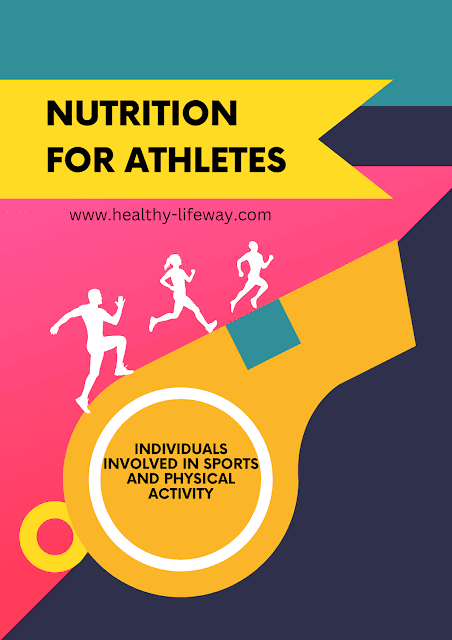Nutrition for Athletes
 |
| Nutrition for Athletes |
Nutrition for Athletes
Understanding the Unique Nutritional Needs of Individuals Involved in Sports and Physical Activity
Introduction
Athletes, whether professional or recreational, engage in rigorous physical activity that demands optimal performance and recovery. Proper nutrition plays a vital role in supporting their athletic endeavors. This article aims to explore the unique nutritional needs of athletes and provide insights into creating a well-rounded nutrition plan to enhance athletic performance, promote recovery, and maintain overall health.
Fueling for Performance
Athletes require an increased amount of energy to fuel their physical activity. Adequate calorie intake is crucial to support energy expenditure and optimize performance. Carbohydrates are the primary source of energy for athletes, and they should focus on consuming complex carbohydrates from whole grains, fruits, and vegetables. Additionally, incorporating lean proteins and healthy fats is essential for muscle repair and overall energy balance.
Hydration
Proper hydration is paramount for athletes to maintain performance and prevent dehydration It is essential to maintain sufficient fluid intake prior to, during, and following exercise. Water is typically sufficient for most activities, but for intense or prolonged exercise, sports drinks containing electrolytes may be beneficial. Athletes should monitor their urine color and aim to maintain a light yellow or clear color as an indicator of adequate hydration.
Pre-Workout Nutrition
Eating a balanced meal or snack before a workout or competition provides the necessary fuel and nutrients for optimal performance. Ideally, athletes should consume a meal rich in carbohydrates, moderate in protein, and low in fat a few hours before exercise. If time is limited, a smaller snack that includes carbohydrates and a small amount of protein can be consumed 1-2 hours before the activity.
During-Workout Nutrition
For longer endurance activities lasting over an hour, consuming carbohydrates during exercise can help maintain blood sugar levels and delay fatigue. Sports drinks, energy gels, or easily digestible snacks like bananas or energy bars can be consumed to provide a quick source of energy. It's important to practice fueling strategies during training to identify what works best for each individual.
Post-Workout Recovery
Proper nutrition after exercise is vital for muscle recovery and replenishing energy stores. Consuming a combination of carbohydrates and protein within 30-60 minutes after exercise helps promote muscle repair and glycogen replenishment. Foods like lean meats, fish, dairy products, whole grains, fruits, and vegetables are excellent choices for post-workout meals or snacks.
Adequate Protein Intake
Athletes involved in strength and endurance training require additional protein to support muscle repair and growth. Good sources of protein include lean meats, poultry, fish, eggs, dairy products, legumes, and plant-based protein sources like tofu and tempeh. Distributing protein intake evenly throughout the day is recommended to optimize muscle synthesis.
Micronutrient Considerations
Athletes need to ensure they meet their micronutrient requirements, including vitamins and minerals. A varied diet that includes a colorful assortment of fruits and vegetables provides essential vitamins, minerals, and antioxidants necessary for optimal performance and recovery. In some cases, specific micronutrient supplementation may be necessary, but it is important to consult with a healthcare professional or sports dietitian before starting any supplementation regimen.
Individualized Nutrition Plans
Each athlete has unique nutritional needs based on factors such as age, gender, body composition, training intensity, and sport-specific demands. It is recommended that athletes work with a qualified sports dietitian to develop an individualized nutrition plan tailored to their specific requirements. A sports dietitian can provide guidance on meal timing, portion sizes, nutrient distribution, and supplementation, if necessary.
Periodization and Competition Nutrition
Athletes can benefit from periodizing their nutrition to match their training phases and competition schedules. Adjusting calorie intake, macronutrient ratios, and timing of meals based on training goals and competition events can optimize performance. Implementing a well-designed nutrition plan during pre-competition, competition, and post-competition periods helps athletes perform at their best and recover effectively.
Conclusion
Nutrition plays a crucial role in the performance, recovery, and overall health of athletes. Understanding the unique nutritional needs of individuals involved in sports and physical activity is essential for optimizing performance and achieving athletic goals. By focusing on proper fueling, hydration, pre- and post-workout nutrition, protein intake, micronutrient considerations, and individualized nutrition plans, athletes can enhance their performance, support recovery, and maintain long-term well-being.
Remember, consulting with a sports dietitian or healthcare professional can provide personalized guidance based on individual needs and goals. By prioritizing nutrition as a key component of training, athletes can unlock their full potential and excel in their chosen sports.







Post a Comment